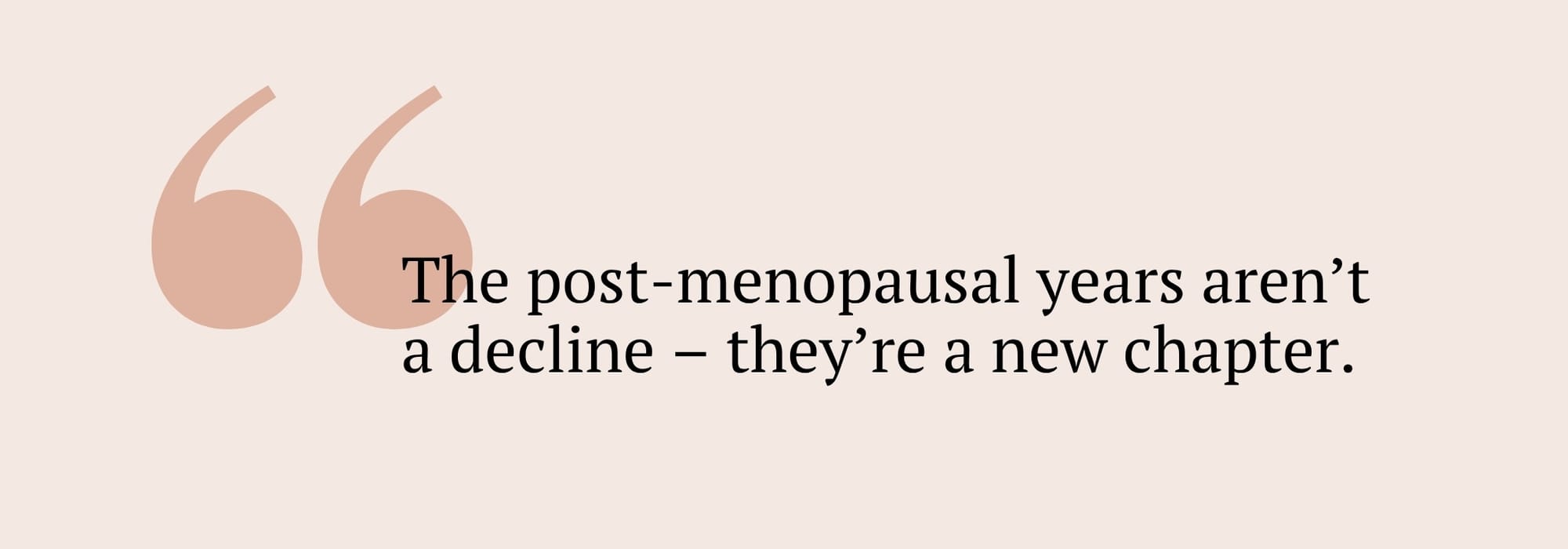Menopause might be talked about more these days, but that doesn’t mean we’re always getting it right. From ‘being too young’ for it to being dismissed as ‘just’ hot flushes, we’re chatting to the experts to separate fact from fiction
Around 13 million people are currently going through menopause or perimenopause in the UK, which equates to roughly a third of the female population. Yet, despite this, it’s only in the past decade that society has actually decided to really speak about it. Whether it’s documentaries or menopause influencers, we’re certainly hearing more about menopause than ever before – but that doesn’t always mean we’re prepared for it.
A 2023 study of women under 40, published in BMC Women’s Health, found that most had very limited knowledge about menopause, and more than 60% of menopausal women only started learning once their own symptoms hit. Is it any wonder then that the average person still feels perplexed when it comes to this life transition? Let’s break down some of the most common menopause myths, to ensure you’re informed, not blindsided.
Myth 1: Menopause only hits in your 50s
“One of the most common myths about menopause is that it begins at 50, but perimenopause – the transitional phase before periods stop completely – can begin in your late 30s or early 40s, sometimes even earlier,” says nutritionist and autoimmune expert VJ Hamilton. “During this time, hormonal fluctuations begin to affect everything from sleep and mood to skin, memory, and menstrual cycles. But, because these shifts often happen while you’re still having periods, they’re easy to overlook or mislabel as ‘stress’ or ‘burnout’.”
While perimenopause can begin up to 10 years before menopause, those with symptoms before 45 could also be experiencing early menopause, which impacts around 5% of women, according to NHS Inform.
“There’s also a group of women who experience early menopause or premature ovarian insufficiency (POI) – which occurs when ovarian function declines before age 40,” VJ adds. “This can happen spontaneously, or due to medical treatments (like chemotherapy or surgery), or genetic factors.”
The takeaway? Don’t assume your symptoms aren’t hormone related just because you haven’t hit 50; chat to a doctor if you’re at all worried about them or any symptoms that arise, to ensure you get the right support.
Myth 2: It’s all about hot flushes
A study in the journal Menopause revealed that 80% of people going through menopause have hot flushes, showing that while this is a common symptom, 20% of people still go through menopause without them.
“Menopause symptoms are wide-ranging and systemic, because oestrogen, progesterone, and other sex hormones don’t just influence reproductive function – they affect the brain, gut, joints, skin, bones, cardiovascular system, and immune health,” explains VJ. “There’s no one-size-fits-all when it comes to menopause symptoms. While some experience hot flushes, others have joint pain, mood changes, or digestion issues.”
This myth also means the way we talk about menopause isn’t inclusive. We know that those from different cultures experience menopause differently, for example Japanese women have been shown to have fewer hot flushes than other countries, as research in the Journal of Nutrition notes. When we associate menopause solely with hot flushes, it stops those who don’t have them getting the help they need.
“The myth that menopause is only about hot flushes creates a barrier to getting the right support. Many women are left thinking: ‘This can’t be menopause – I’m not getting hot flushes,’” explains VJ.
Myth 3: Menopause is something you need to suffer through
Just because menopause is a natural and inevitable part of ageing, doesn’t mean it’s something you have to endure in silence; there is lots of advice out there and things you can try in order to feel like yourself again.
And while a lot of women find menopause difficult, it’s worth noting that not everyone does, with one survey, published in Post Reproductive Health in 2023, finding that more than 20% of women felt their menopause experience was actually fine. But, even if it is tough, that doesn’t mean it has to stay that way.

“The post-menopausal years aren’t a decline – they’re a new chapter. With the right tools, many women find increased clarity, energy, and stability in this phase,” says VJ. “But it starts with understanding that menopause is not something to endure – it’s a transition you can actively support with the right tools and guidance.”
Myth 4: Hormone replacement therapy (HRT) is a last resort
One tool that can help with menopause is HRT, but some people are still cautious of it. “HRT is the most effective treatment for relieving menopausal symptoms such as hot flushes, insomnia, anxiety, and brain fog. Many women are worried about safety, but this is actually due to outdated and misunderstood information,” says Dr Hazel Parkinson, a GP and menopause expert, specialising in menopausal skin and wellness. “HRT is really beneficial for long-term health too, it can significantly reduce osteoporosis and fractures, reduces (not increases) your risk of heart disease, stroke and diabetes, as well as helping with sleep and mood.”
Part of the problem is also that not all women are being offered HRT. In fact, one landmark study produced by the Fawcett Society (based on survey data commissioned by Channel 4), shows that fewer than 40% of those with menopause symptoms were offered it by their GP, and, in general, people may not be aware that HRT can be catered to them.
“HRT is not a one size-fits-all; it can be personalised and there’s different types, such as patches and gels, so speak to your GP to find the right HRT solution for you,” adds Dr Parkinson.
Myth 5: You only need to understand menopause if you’re living it
Menopause education shouldn’t just be reserved for those going through it. Knowledge gaps persist even in this day and age, whether that’s employers (one survey by the CIPD found that only 24% of people say their organisation has a menopause policy or other support measures in place), healthcare (not all GPs currently have menopause training, and in January 2023 the UK government rejected calls to make it mandatory), or just allowing us to support someone else going through it.
“Menopause isn’t ‘just a women’s issue’ – it’s a health systems issue, a workplace issue, and a personal health turning point,” explains VJ.
There’s so much to learn about menopause, but it’s important to refer to the right sources. Visit up-to-date, fact-driven websites such the British Menopause Society or the Menopause Charity. Or if you’re experiencing any symptoms of menopause, make an appointment with your GP to go through the next steps.


Comments